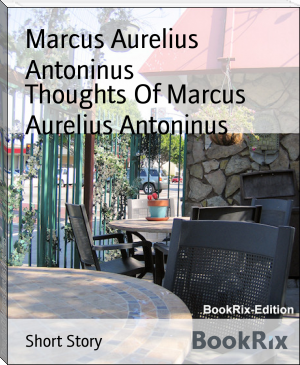Thoughts Of Marcus Aurelius Antoninus - Marcus Aurelius Antoninus (novels to read for beginners .TXT) 📗

- Author: Marcus Aurelius Antoninus
Book online «Thoughts Of Marcus Aurelius Antoninus - Marcus Aurelius Antoninus (novels to read for beginners .TXT) 📗». Author Marcus Aurelius Antoninus
To Have Desired A Plank Bed And Skin, And Whatever Else Of The Kind
Belongs To The Grecian Discipline.
[A] In The Works Of Justinus There Is Printed A Letter To One
Diognetus, Whom The Writer Names "Most Excellent." He Was A
Gentile, But He Wished Very Much To Know What The Religion Of
The Christians Was, What God They Worshipped, And How This
Worship Made Them Despise The World And Death, And Neither
Believe In The Gods Of The Greeks Nor Observe The Superstition
Of The Jews; And What Was This Love To One Another Which They
Had, And Why This New Kind Of Religion Was Introduced Now And
Not Before. My Friend Mr. Jenkins, Rector Of Lyminge In Kent,
Has Suggested To Me That This Diognetus May Have Been The Tutor
Of M. Antoninus.
7. From Rusticus[A] I Received The Impression That My Character Required
Improvement And Discipline; And From Him I Learned Not To Be Led Astray
To Sophistic Emulation, Nor To Writing On Speculative Matters, Nor To
Delivering Little Hortatory Orations, Nor To Showing Myself Off As A Man
Who Practises Much Discipline, Or Does Benevolent Acts In Order To Make
A Display; And To Abstain From Rhetoric, And Poetry, And Fine Writing;
And Not To Walk About In The House In My Outdoor Dress, Nor To Do Other
Things Of The Kind; And To Write My Letters With Simplicity, Like The
Letter Which Rusticus Wrote From Sinuessa To My Mother; And With Respect
To Those Who Have Offended Me By Words, Or Done Me Wrong, To Be Easily
Disposed To Be Pacified And Reconciled, As Soon As They Have Shown A
Readiness To Be Reconciled; And To Read Carefully, And Not To Be
Satisfied With A Superficial Understanding Of A Book; Nor Hastily To
Give My Assent To Those Who Talk Overmuch; And I Am Indebted To Him For
Being Acquainted With The Discourses Of Epictetus, Which He Communicated
To Me Out Of His Own Collection.
[A] Q. Junius Rusticus Was A Stoic Philosopher, Whom Antoninus
Valued Highly, And Often Took His Advice (Capitol. _M. Antonin_.
Iii).
Antoninus Says, [Greek: Tois Epiktêteiois Hypomnêmasin] Which
Must Not Be Translated, "The Writings Of Epictetus," For
Epictetus Wrote Nothing. His Pupil Arrian, Who Has Preserved
For Us All That We Know Of Epictetus, Says, [Greek: Tauta
Epeirathên Hypomnêmata Emautô Diaphylaxai Tês Ekeinou Dianoias]
(_Ep. Ad. Gell_.)
8. From Apollonius[A] I Learned Freedom Of Will And Undeviating
Steadiness Of Purpose; And To Look To Nothing Else, Not Even For A
Moment, Except To Reason; And To Be Always The Same, In Sharp Pains, On
The Occasion Of The Loss Of A Child, And In Long Illness; And To See
Clearly In A Living Example That The Same Man Can Be Both Most Resolute
And Yielding, And Not Peevish In Giving His Instruction; And To Have Had
Before My Eyes A Man Who Clearly Considered His Experience And His Skill
In Expounding Philosophical Principles As The Smallest Of His Merits;
And From Him I Learned How To Receive From Friends What Are Esteemed
Favors, Without Being Either Humbled By Them Or Letting Them Pass
Unnoticed.
[A] Apollonius Of Chalcis Came To Rome In The Time Of Pius To
Be Marcus' Preceptor. He Was A Rigid Stoic.
Story 3 (The Thoughts Of Marcus Aurelius Antonius) Pg 38
9. From Sextus,[A] A Benevolent Disposition, And The Example Of A
Family Governed In A Fatherly Manner, And The Idea Of Living Conformably
To Nature; And Gravity Without Affectation, And To Look Carefully After
The Interests Of Friends, And To Tolerate Ignorant Persons, And Those
Who Form Opinions Without Consideration:+ He Had The Power Of Readily
Accommodating Himself To All, So That Intercourse With Him Was More
Agreeable Than Any Flattery; And At The Same Time He Was Most Highly
Venerated By Those Who Associated With Him: And He Had The Faculty Both
Of Discovery And Ordering, In An Intelligent And Methodical Way, The
Principles Necessary For Life; And He Never Showed Anger Or Any Other
Passion, But Was Entirely Free From Passion, And Also Most Affectionate;
And He Could Express Approbation Without Noisy Display, And He Possessed
Much Knowledge Without Ostentation.
10. From Alexander[B] The Grammarian, To Refrain From Fault-Finding, And
Not In A Reproachful Way To Chide Those Who Uttered Any Barbarous Or
Solecistic Or Strange-Sounding Expression; But Dexterously To Introduce
The Very Expression Which Ought To Have Been Used, And In The Way Of
Answer Or Giving Confirmation, Or Joining In An Inquiry About The Thing
Itself, Not About The Word, Or By Some Other Fit Suggestion.
11. From Fronto[C] I Learned To Observe What Envy And Duplicity And
Hypocrisy Are In A Tyrant, And That Generally Those Among Us Who Are
Called Patricians Are Rather Deficient In Paternal Affection.
12. From Alexander The Platonic, Not Frequently Nor Without Necessity To
Say To Any One, Or To Write In A Letter, That I Have No Leisure; Nor
Continually To Excuse The Neglect Of Duties Required By Our Relation To
Those With Whom We Live, By Alleging Urgent Occupations.
13. From Catulus[D] Not To Be Indifferent When A Friend Finds Fault,
Even If He Should Find Fault Without Reason, But To Try To Restore Him
To His Usual Disposition; And To Be Ready To Speak Well Of Teachers, As
It Is Reported Of Domitius And Athenodotus; And To Love My Children
Truly.
[A] Sextus Of Chaeronea, A Grandson Of Plutarch, Or Nephew, As
Some Say; But More Probably A Grandson.
[B] Alexander Was A Grammaticus, A Native Of Phrygia. He Wrote
A Commentary On Homer; And The Rhetorician Aristides Wrote A
Panegyric On Alexander In A Funeral Oration.
[C] M. Cornelius Fronto Was A Rhetorician, And In Great Favor
With Marcus. There Are Extant Various Letters Between Marcus
And Fronto.
[D] Cinna Catulus, A Stoic Philosopher.
14. From My Brother[A] Severus, To Love My Kin, And To Love Truth, And
To Love Justice; And Through Him I Learned To Know Thrasea, Helvidius,
Cato, Dion, Brutus;[B] And From Him I Received The Idea Of A Polity In
Which There Is The Same Law For All, A Polity Administered With Regard
To Equal Rights And Equal Freedom Of Speech, And The Idea Of A Kingly
Government Which Respects Most Of All The Freedom Of The Governed; I
Story 3 (The Thoughts Of Marcus Aurelius Antonius) Pg 39Learned From Him Also + Consistency And Undeviating Steadiness In My
Regard For Philosophy; And A Disposition To Do Good, And To Give To
Others Readily, And To Cherish Good Hopes, And To Believe That I Am
Loved By My Friends; And In Him I Observed No Concealment Of His
Opinions With Respect To Those Whom He Condemned, And That His Friends
Had No Need To Conjecture What He Wished Or Did Not Wish, But It Was
Quite Plain.
[A] The Word Brother May Not Be Genuine. Antoninus Had No
Brother. It Has Been Supposed That He May Mean Some Cousin.
Schultz In His Translation Omits "Brother," And Says That This
Severus Is Probably Claudius Severus, A Peripatetic.
[B] We Know, From Tacitus (_Annal._ Xiii., Xvi. 21; And Other
Passages), Who Thrasea And Helvidius Were. Plutarch Has Written
The Lives Of The Two Catos, And Of Dion And Brutus. Antoninus
Probably Alludes To Cato Of Utica, Who Was A Stoic.
15. From Maximus[A] I Learned Self-Government, And Not To Be Led Aside
By Anything; And Cheerfulness In All Circumstances, As Well As In
Illness; And A Just Admixture In The Moral Character Of Sweetness And
Dignity, And To Do What Was Set Before Me Without Complaining. I
Observed That Everybody Believed That He Thought As He Spoke, And That
In All That He Did He Never Had Any Bad Intention; And He Never Showed
Amazement And Surprise, And Was Never In A Hurry, And Never Put Off
Doing A Thing, Nor Was Perplexed Nor Dejected, Nor Did He Ever Laugh To
Disguise His Vexation, Nor, On The Other Hand, Was He Ever Passionate Or
Suspicious. He Was Accustomed To Do Acts Of Beneficence, And Was Ready
To Forgive, And Was Free From All Falsehood; And He Presented The
Appearance Of A Man Who Could Not Be Diverted From Right, Rather Than Of
A Man Who Had Been Improved. I Observed, Too, That No Man Could Ever
Think That He Was Despised By Maximus, Or Ever Venture To Think Himself
A Better Man. He Had Also The Art Of Being Humorous In An Agreeable
Way.+
[A] Claudius Maximus Was A Stoic Philosopher, Who Was Highly
Esteemed Also By Antoninus Pius, Marcus' Predecessor. The
Character Of Maximus Is That Of A Perfect Man. (See Viii. 25.)
16. In My Father[A] I Observed Mildness Of Temper, And Unchangeable
Resolution In The Things Which He Had Determined After Due Deliberation;
And No Vain-Glory In Those Things Which Men Call Honors; And A Love Of
Labor And Perseverance; And A Readiness To Listen To Those Who Had
Anything To Propose For The Common Weal; And Undeviating Firmness In
Giving To Every Man According To His Deserts; And A Knowledge Derived
From Experience Of The Occasions For Vigorous Action And For Remission.
And I Observed That He Had Overcome All Passion For Boys; And He
Considered Himself No More Than Any Other Citizen;[B] And He Released
His Friends From All Obligation To Sup With Him Or To Attend Him Of
Necessity When He Went Abroad, And Those Who Had Failed To Accompany
Him, By Reason Of Any Urgent Circumstances, Always Found Him The Same. I
Observed Too His Habit Of Careful Inquiry In All Matters Of
Deliberation, And His Persistency, And That He Never Stopped His
Investigation Through Being Satisfied With Appearances Which First
Present Themselves; And That His Disposition Was To Keep His Friends,
And Not To Be Soon Tired Of Them, Nor Yet To Be Extravagant In His
Story 3 (The Thoughts Of Marcus Aurelius Antonius) Pg 40Affection; And To Be Satisfied On





Comments (0)